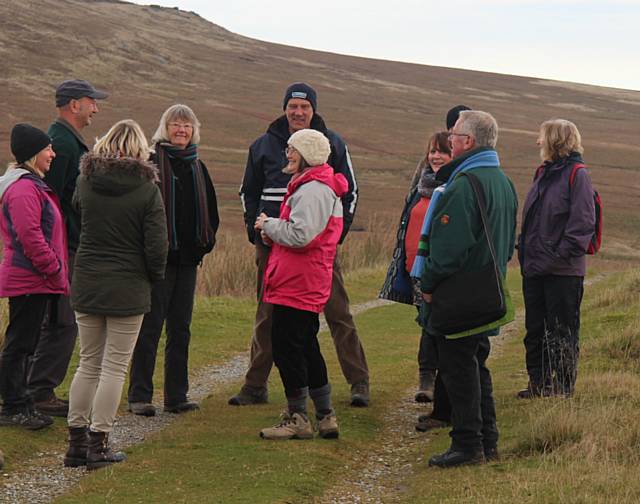Landscape takes centre stage at Pennine Prospects’ Annual Conference
Date published: 06 December 2016

Group on site visit at the Pennine Prospects’ Annual Conference
‘To designate or not to designate’; that was the question at the heart of the Pennine Prospects’ Annual Conference this year.
Nearly 80 delegates battled through snow and traffic chaos to attend the conference in Halifax; travelling from Cumbria, North Yorkshire and the Peak District, as well as the South Pennines, to hear speakers from England, Ireland, Wales, Scotland and Italy.
As a champion of the South Pennines, a distinctive landscape lacking official recognition or special designation, Pennine Prospects had brought together a wide range of delegates from the public and private sectors to consider the opportunities and challenges faced by those trying to promote, protect and manage distinctive landscapes.
Pam Warhurst, Pennine Prospects Chairwoman, warned delegates that there was no-one else to take up the challenge. “This is not someone else’s problem; this is for us. People don’t talk about landscapes but they care about them. It’s up to us to find a way to engage with people so that they ‘get it’. How do we release the positive?
“Pennine Prospects, our partners and our local communities are best placed to set our own agenda for the South Pennines; the time is right to shape the future. If we don’t someone else will; and we may not like their chosen direction. We have a real opportunity here to engage with local communities and look after this stunning landscape for this and future generations.”
Michael Starrett, Chief Executive of the Heritage Council Ireland, highlighted the importance of heritage as a way in which to help people connect, or reconnect, with their landscapes. Patrizia Rossi, former Director of Alpi Marittime Nature Park, Italy spoke of the difficulties faced by two national parks, one in Italy and one in France, when trying to work together. Progress has been made with work on wildlife protection and re-introduction and through the creation of a common map but the area has not yet been designated as an International Park; an idea first proposed in the 1960s.
Howard Davies, Chief Executive of the National Association for Areas of Outstanding Natural Beauty, voiced his opposition to boundary signs that clearly mark the beginning, and therefore the end, of a designated area. He argued that landscapes did not work in that way and areas that did not enjoy a designation were not inherently poorer in quality than those that did. He asked how we should manage those areas without; citing the need for a clear plan and strong partnerships; both, he argued, already present in Pennine Prospects.
Managing specific landscapes was addressed by Chris Dean, Partnership Manager of Moors for the Future, an organisation dedicated to the restoration of 32 square kilometres of moorland in the Peak District and South Pennines. He praised the action and commitment of partners, such as landowners and funders, since work began in 2002. Already the devastation of 150 years’ industrial pollution has been halted in some places. Although the work is costly, at approximately £1 million per square kilometre of blanket bog the cost of not restoring it will be far higher in terms of climate change impact. Restored peatland has the capacity to store carbon and play a vital role in flood risk management.
Helen McDade, Head of Policy at the John Muir Trust, championed the need for the protection of wild land in Scotland, surprisingly a country with only two National Parks, only created in 2002. She highlighted the danger posed by large wind farm developments, especially their impact on peatland. She argued that landscapes should be as important and as ‘worthy’ of protection as that afforded nature, which itself relies on healthy landscapes.
Hugh Ellis, Chief Executive of the Town and Country Planning Association, gave an impassioned plea for huge improvements to be made in public planning, which, he argues, is in crisis. Narrow criteria, deregulation and a lack of vision have created a situation in which the slums of tomorrow are now being built, with no thought for the people who will live and work there. People must be placed at the heart of planning decisions, he argued.
Following the morning speakers delegates then had the opportunity to discuss issues raised in four workshops in the afternoon.
Do you have a story for us?
Let us know by emailing news@rochdaleonline.co.uk
All contact will be treated in confidence.
Most Viewed News Stories
- 1Drugs and cash seized during morning raids at suspected stash houses
- 2Middleton school hails another outstanding inspection result
- 3Former councillor and hospital campaigner Jean Ashworth has died
- 4Ogden family announces intention to invest £2m in Rochdale AFC
- 5Man convicted after police car filmed driving dangerously in Kirkholt
To contact the Rochdale Online news desk, email news@rochdaleonline.co.uk or visit our news submission page.
To get the latest news on your desktop or mobile, follow Rochdale Online on Twitter and Facebook.


